|
This is my dynamic, frequently updated homepage. This is a NewsLog, also known as a WebLog or Blog.
Everything is evolving, so don't assume too much.
People to watch:
Adina Levin
Andrius Kulikauskas
Britt Blaser
Catherine Austin Fitts
Chris Corrigan
Clay Shirky
Dan Gillmor
Dave Pollard
David Allen
David Weinberger
Dewayne Mikkelson
Dina Mehta
Doc Searls
Elisabet Sahtouris
Elizabeth Lawley
Euan Semple
Florian Brody
Frank Patrick
Gen Kenai
George Dafermos
George Por
Graham Hancock
Greg Elin
Hazel Henderson
Heiner Benking
Inspector Lohman
Jean Houston
Jerry Michalski
Jim McGee
Jim Moore
John Abbe
John Perry Barlow
John Robb
Joi Ito
Jon Husband
Jon Lebkowsky
Jon Udell
Jonathan Peterson
Judith Meskill
Julian Elvé
Julie Solheim
Kevin Marks
Lawrence Lessig
Leif Smith
Letecia Layson
Lilia Efimova
Lisa Rein
Marc Canter
Mark Oeltjenbruns
Mark Pilgrim
Mark Woods
Martin Dugage
Martin Roell
Mary Forest
Matt Mower
Max Sandor
Michael Fagan
Mike Owens
Mikel Maron
Mitch Kapor
Mitch Ratcliffe
Nathalie dArbeloff
Netron
Noam Chomsky
Paul Hughes
Peter Kaminski
Phil Wolff
Philippe Beaudoin
Ray Ozzie
Raymond Powers
Rebecca Blood
Roger Eaton
Roland Tanglao
Ross Mayfield
Scott Lemon
Sebastian Fiedler
Sebastien Paquet
Skip Lancaster
Spike Hall
Steven Johnson
Stuart Henshall
Thomas Burg
Thomas Madsen-Mygdal
Thomas Nicholls
Timothy Wilken
Todd Suomela
Tom Atlee
Tom Munnecke
Tom Tomorrow
Ton Zijlstra
Lionel Bruel
Loic Le Meur
Nancy White
Mark Frazier
Merlin Silk
Robert Paterson
Colby Stuart
Nova Spivack
Dan Brickley
Ariane Kiss
Vanessa Miemis
Bernd Nurnberger
Sites to watch:
Electronic Frontier Foundation
Co-intelligence Institute
Free Expression Network
Collective Intelligence
Action without borders
Manufacturing Dissent
Explorers Foundation
Disclosure Project
ThoughtsOnThinking
Forbidden Science
Emergent by Design
Greater Democracy
Global Ideas Bank
Independent Media
Space Collective
Friendly Favors
Escape Velocity
Disinformation
Collective Web
WorldChanging
YES Magazine
Disinfopedia
NotThisBody
MetaFilter
Webcamorama
BoingBoing
Smart Mobs
Do No Harm
Imaginify
FutureHi
Openworld
Nanodot
HeadMap
Rhizome
Absara
Edge
Junto
French:
Emmanuelle
Manur
Elanceur
Loeil de Mouche
IokanaaN
Blog d'Or
Le Petit Calepin
GeeBlog
Absara
Guillaume Beuvelot
Ming Chau
Serge Levan
Jean Michel Billaut
C'est pas Mécanique

I live in Toulouse, France where the time now is:
01:08
Unique Readers:

Primarily
Public Domain
Everything I've written here is dedicated to the
Public Domain.

The quotes from other people's writings, and the pictures used might or might not be copyrighted, but are considered fair use. Thus, overall, this weblog could best be described as being:
Primarily Public Domain. |
Syndication:
 ![Validate my RSS feed [Valid RSS]](http://www.newciv.org/pic/valid-rss.png)
|
| Saturday, November 30, 2002 |  |
|
|
|
What's a metalogue? I don't think it is in the dictionary. But a prologue is something one says in the beginning, to introduce something. An epilogue is something one says after the main action, as a sort of conclusion. A monologue is a prolonged presentation of some kind, spoken by one person. A dialogue is an exchange of ideas between two or more people. I suppose a metalogue would be talking ABOUT things that are happening, from a somewhat elevated perspective. Actually I think most weblogs I read are metalogues. They try to connect up some dots, try to discover clues in information and events, and try to connect that up with something bigger or deeper. Where are we going? What does it mean?
[ Information | 2002-11-30 01:01 | | PermaLink ] More >
|
|
| Friday, November 29, 2002 |  |
|
|
|
Peter Kaminski via Seb mentions:
Whoosh: Business in the Fast Lane,Tom McGehee on what makes a company suck or rock:
| Compliance Companies | Creation Companies | | Policy driven | Principle driven | | Rule based | Relationship based | | Conducts training | Allows for structured and unstructured learning | | Forced organization | Self-organizing | | Reactive | Proactive | | Good of organization over good of individual | Good of organization through good of individuals | | Measures activity | Measures outcome | | Ordered | Chaotic | | Closed system | Open system | | Patterned | Emergent | | Internal focus | External focus | | Risk avoidance | Opportunity creation | | Confuses models with reality | Understands modeling | | Tries to re-create past success | Tries to create new successes | | Methodology based | Model based | | Expert's mind | Beginner's mind | | Tolerates diversity | Thrives on diversity | | Seeks equilibrium | Seeks progress | | Deficit focused | Positive focused | | Creates burning platforms | Creates compelling opportunities |
Application to national governments or revolutionary organizations is left as an exercise for the reader.
[ Organization | 2002-11-29 16:01 | | PermaLink ] More >
|
|
|
|
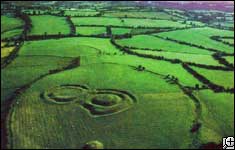 An enormous underground temple has been discovered under the Hill of Tara in Ireland, dated apparently from 2500 to 2300 B.C.. It was once surrounded by 300 towering oak posts and lies directly underneath the hill. It is a site that already has revealed many archaeological finds, but nothing of this magnitude. An enormous underground temple has been discovered under the Hill of Tara in Ireland, dated apparently from 2500 to 2300 B.C.. It was once surrounded by 300 towering oak posts and lies directly underneath the hill. It is a site that already has revealed many archaeological finds, but nothing of this magnitude.
[ History | 2002-11-29 16:42 | | PermaLink ] More >
|
|
|
|
New Scientist reports some progress in quantum computing. In short, as opposed to normal computers that use bits that can be either on or off, quantum computing uses 'qubits' that can be in several states at once. That opens the door to the rather magical possibility of finding all solutions to a given problem at the same time. Practical applications appear to be far off. The current progress concerned the ability to keep one atom away from interferance, while still being able to read what state it is in.
[ Science | 2002-11-29 17:05 | | PermaLink ] More >
|
|
|
|
technorati.com is the best site I've seen sofar for showing who links to who's weblogs. Well, mainly I'm interested in who links to what on MY log, mostly to see which stories worked well, and to discover new friends who are exploring similar topics. The other sites that attempt to show connections between weblogs have sofar not shown me much more than I already knew, but in my technorati listing I right away get to know some new people. And it is great that in this world, plagiarism is flattery. And a way of voting. I copy somebody else's story, and somebody else copies my copy, and that shows that all of us found it important and interesting.
[ Information | 2002-11-29 23:59 | | PermaLink ] More >
|
|
| Thursday, November 28, 2002 |  |
|
|
|
 I'm thankful that there is a little girl who will wake me up and take me by the hand to go outside in the wind and sit by the curb to watch the leaves blow off the trees. And who will hand me an instrument so we can march in a parade through the house. Somebody who will remember that it is always a good time for chocolate milk. I'm thankful that there is a little girl who will wake me up and take me by the hand to go outside in the wind and sit by the curb to watch the leaves blow off the trees. And who will hand me an instrument so we can march in a parade through the house. Somebody who will remember that it is always a good time for chocolate milk.
I am thankful for other people too. Thankful for love and loyalty, for being there no matter what, for caring, for trusting, for noticing and remembering things I forget. But mostly for waking me up to the preciousness of life in the moment. Making me breathe and making me smile.
[ Diary | 2002-11-28 01:59 | | PermaLink ] More >
|
|
|
|
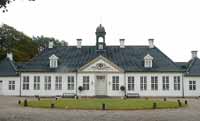 My phone rings at 3AM. "Er det flyttemanden? Det er Torben ovre fra Gammel Holte GÃ¥rd..." I was confused for a moment, and thought it was some Danish friend of mine making fun. Until I finally remembered that I have a phone number in Denmark, and I had it forwarded to the phone on my desk in Los Angeles. It was the first wrong number. It was a guy trying to call a moving company to move some stuff. But it sounded like he was right there, and it connected me right away with a bunch of things, like the Danish joviality. And he happened to call from a place very close to where I lived when I grew up. For that matter, a place I was looking at every day while waiting for the bus to school. It is a stately manor which today is a museum, and which I paid absolutely no attention to while waiting for the bus. Just made the world a good deal smaller suddenly. My phone rings at 3AM. "Er det flyttemanden? Det er Torben ovre fra Gammel Holte GÃ¥rd..." I was confused for a moment, and thought it was some Danish friend of mine making fun. Until I finally remembered that I have a phone number in Denmark, and I had it forwarded to the phone on my desk in Los Angeles. It was the first wrong number. It was a guy trying to call a moving company to move some stuff. But it sounded like he was right there, and it connected me right away with a bunch of things, like the Danish joviality. And he happened to call from a place very close to where I lived when I grew up. For that matter, a place I was looking at every day while waiting for the bus to school. It is a stately manor which today is a museum, and which I paid absolutely no attention to while waiting for the bus. Just made the world a good deal smaller suddenly.
[ Diary | 2002-11-28 14:07 | 0 comments | PermaLink ]
|
|
|
|
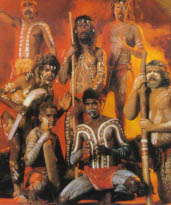 Mikela Tarlow talks in "Digital Aboriginal" about a traveler who had spent many years in the Australian outback with an aboriginal tribe. He explained that the aboriginal elders counseled their people to avoid the seduction of agriculture. Mikela Tarlow talks in "Digital Aboriginal" about a traveler who had spent many years in the Australian outback with an aboriginal tribe. He explained that the aboriginal elders counseled their people to avoid the seduction of agriculture."Suddenly, instead of following the weather, you want the weather to be different. And it is now easier to put things in straight lines. And because you have planted, you need fences. And since you have planted, you can accumulate possessions. And once your tribe is bound to a fixed address, forms of hierarchy emerge that were not possible when it had to stay on the move. Because you have put down roots, for the first time you must consider defending your territory. Thus, convenient as it is, planting is the beginning of control. Merely because you put a small seed in the ground, you are now invested in a whole system of maintenance that requires you to stay put. You are no longer free to follow what calls. So, the aboriginal elders wisely teach their people to avoid agriculture. The aboriginal spirit requires the freedom to follow the wind." Hm, that is certainly different from the way westeners normally think. For us it is often a powerful metaphor that we're putting seeds in the ground and staying around to nuture and defend them. But this makes sense on several levels. Maybe a hint of another way of being, where we don't trap ourselves in our own net of obligations and expectations."His profound sensitivity is possible only because he does not have to wait for seeds he has planted. His perceptions can be long and deep, since he has no territory that he must defend. His mind is quiet, since he is not attached to outcomes. Because he does not have to plan, his spirit is free."
[ Inspiration | 2002-11-28 15:06 | | PermaLink ] More >
|
|
| Wednesday, November 27, 2002 |  |
|
|
|
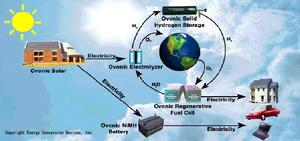 Joi Ito talks about the Hydrogen Economy: "The picture above is ECD's vision of the Hydrogen Economy. Get Carbon out of the picture. Reduce the cycle to the basic elements of the universe. Photons creating energy to break H2O into Hydrogen and Oxygen. Oxygen goes back to the atmosphere and the Hydrogen is stored and transported in the Hydride material. The Hydrogen is later extracted to create energy through combustion or through the creation of electrical energy with a fuel cell. This electricity can be stored in a Hydride battery which is also based on Hydrogen. The electricity obviously can be used for propulsion or be converted into meta-energy, or information. Photons->Hydrogen->Electrons->Bits thatÂ’s all we need. No CO2, fossil fuels, Uranium or any of the non-big-bang stuff please. Oh and by the way, the basic material and the phenomenon used to store hydrogen in a solid, the convert hydrogen in to electricity and the store electricity in hydride batteries is the based on the same basic science." Joi Ito talks about the Hydrogen Economy: "The picture above is ECD's vision of the Hydrogen Economy. Get Carbon out of the picture. Reduce the cycle to the basic elements of the universe. Photons creating energy to break H2O into Hydrogen and Oxygen. Oxygen goes back to the atmosphere and the Hydrogen is stored and transported in the Hydride material. The Hydrogen is later extracted to create energy through combustion or through the creation of electrical energy with a fuel cell. This electricity can be stored in a Hydride battery which is also based on Hydrogen. The electricity obviously can be used for propulsion or be converted into meta-energy, or information. Photons->Hydrogen->Electrons->Bits thatÂ’s all we need. No CO2, fossil fuels, Uranium or any of the non-big-bang stuff please. Oh and by the way, the basic material and the phenomenon used to store hydrogen in a solid, the convert hydrogen in to electricity and the store electricity in hydride batteries is the based on the same basic science."
[ Energy | 2002-11-27 17:42 | | PermaLink ] More >
|
|
|
|
And now for the Greenpeace Guide to Environmentally-Friendly Sex. They're only half kidding. In brief, do it during the day to save electricity. Don't involve any genetically engineered fruit. If you're gonna do it in the yard, make sure there are no pesticides in the grass. Don't wear anything PVC or vinyl, but rubber or leather is good. And take a shower together to conserve water.
[ Nature | 2002-11-27 17:51 | | PermaLink ] More >
|
|
|
|
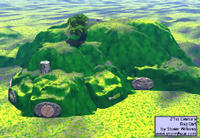 This guy is working on building his own house in a hobbit hole constructed out of concrete pipes. Well, I've always had a fantasy about having an underground house, but maybe not quite like that. This guy is working on building his own house in a hobbit hole constructed out of concrete pipes. Well, I've always had a fantasy about having an underground house, but maybe not quite like that.
[ Stories | 2002-11-27 18:06 | | PermaLink ] More >
|
|
|
|
Jon Udell says: "I was shocked to discover a nest of pirates yesterday, operating brazenly right here in my hometown. They were gathered in a large nondescript building, reading and talking quietly and in some cases listening to music. Some kind of social club, perhaps? Yes, but with a profoundly subversive theme: "sharing" content. This establishment houses large collections of books, magazines, audiotapes, videotapes, CDs, DVDs. And it "shares" these with its patrons. I watched in amazement as people left the building carrying armloads of these content assets, which they "borrow" without paying a nickel to the copyright holders. It's frightening, really. Who knew?"
[ Information | 2002-11-27 22:29 | | PermaLink ] More >
|
|
|
|
Dave Winer announces that Radio Userland, a popular weblogging program, has a new feature of being able to export all posted entries into a standard format, RSS 2.0. RSS is traditionally the format used for syndicating streams of news postings, but 2.0 is flexible enough to store a whole weblog. I'm going to look into implementing that feature, and hopefully it is flexible enough to store weblogs created in my NewsLog program as well. I'm a bit worried about whether it can handle the pictures. Anyway, what this kind of thing can mean is an easy way of moving from one weblog software to another, an easy way of backing up the contents of your weblog, and it opens the door to programs that can browse freely through the content of many weblogs.
[ Programming | 2002-11-27 22:29 | 0 comments | PermaLink ]
|
|
| Tuesday, November 26, 2002 |  |
|
|
|
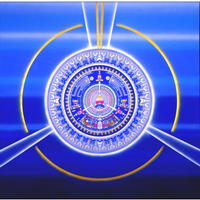 There is very little I know for certain. I know that I am conscious of my own existence, and I'm aware of many changing perceptions of the world I appear to be in, and I have abstract thoughts and feelings related to my experience. That's about it. Anything that my perceptions or my thoughts or my feelings are telling me is something I'm guessing. An abstract over-simplification of something that possibly is real. I have formed a certain extensive mental model of what the world is like, based on what I have perceived and thought, and then tested and verified, but I know it is only my best guess, even when it works well. The only thing I know for sure is that I am conscious right now, and conscious of my own consciousness. One of the first things I notice is that my consciousness returns after times when I haven't been conscious, so one of my first logical guesses is that my own existence is more fundamental than my consciousness, and I keep existing even when I forget to notice it. All that it takes to bring me back is that I notice. There is very little I know for certain. I know that I am conscious of my own existence, and I'm aware of many changing perceptions of the world I appear to be in, and I have abstract thoughts and feelings related to my experience. That's about it. Anything that my perceptions or my thoughts or my feelings are telling me is something I'm guessing. An abstract over-simplification of something that possibly is real. I have formed a certain extensive mental model of what the world is like, based on what I have perceived and thought, and then tested and verified, but I know it is only my best guess, even when it works well. The only thing I know for sure is that I am conscious right now, and conscious of my own consciousness. One of the first things I notice is that my consciousness returns after times when I haven't been conscious, so one of my first logical guesses is that my own existence is more fundamental than my consciousness, and I keep existing even when I forget to notice it. All that it takes to bring me back is that I notice.
[ Inspiration | 2002-11-26 03:53 | | PermaLink ] More >
|
|
|
|
Arch-skeptic Michael Shermer says some good things about intuition in The Captain Kirk Principle - Intuition is the key to knowing without knowing how you know:"Intuition is not subliminal perception; it is subtle perception and learning-- knowing without knowing that you know. Chess masters often "know" the right move to make even if they cannot articulate how they know it. People who are highly skilled in identifying "micromomentary" facial expressions are also more accurate in judging lying. In testing college students, psychiatrists, polygraphists, court judges, police officers and Secret Service agents on their ability to detect lies, only the agents, trained to look for subtle cues, scored above chance. Most of us are not good at lie detection, because we rely too heavily on what people say rather than on what they do."
[ Knowledge | 2002-11-26 04:14 | | PermaLink ] More >
|
|
|
|
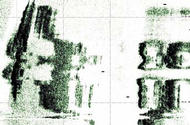 More about the possible man-made structures seen on sonar 2000ft underwater off the west coast of Cuba. Still nobody has gotten around to sending a submarine down there to take real pictures, so there is much speculation. The most controversial aspect is that the water depth would indicate that the structures would be at least 50,000 years old. More about the possible man-made structures seen on sonar 2000ft underwater off the west coast of Cuba. Still nobody has gotten around to sending a submarine down there to take real pictures, so there is much speculation. The most controversial aspect is that the water depth would indicate that the structures would be at least 50,000 years old.
[ Science | 2002-11-26 04:40 | 0 comments | PermaLink ]
|
|
|
|
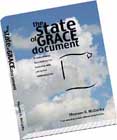 Tom Atlee mentions the State of Grace Document, which is an innovative alternative to contracts in various kinds of relationships, including businesses and personal relationships. It was conceived by Maureen McCarthy. As opposed to contracts, which usually have the premise that the other party quite likely will try to screw you, the State of Grace document has the premise that the parties both want to remain in or return to the state of grace that they started out with, where they're aligned and things are just flowing naturally. So, when a time of transition arrives, where it is no longer working, the point would either be to find the way back to that state, or to revise the agreement, or to realize that it is no longer there, so the relationship is ending. Maureen says: Tom Atlee mentions the State of Grace Document, which is an innovative alternative to contracts in various kinds of relationships, including businesses and personal relationships. It was conceived by Maureen McCarthy. As opposed to contracts, which usually have the premise that the other party quite likely will try to screw you, the State of Grace document has the premise that the parties both want to remain in or return to the state of grace that they started out with, where they're aligned and things are just flowing naturally. So, when a time of transition arrives, where it is no longer working, the point would either be to find the way back to that state, or to revise the agreement, or to realize that it is no longer there, so the relationship is ending. Maureen says:"The State of Grace Document is a radical new way to see the world. It's a tool for those who are searching for a non-litigious way to resolve a difficult situation. Or in the cases where [we] would never resort to that, but the pain of a bad ending leaves us exhausted, it's a remarkable path to peace. It's a concept not yet in practice that will cause great change in the world when adopted because it addresses the potential for problems up front in a loving manner. As a society we avoid saying the marriage could end before the ceremony has begun, the job might not work out as planned, or the business partnership might not be the best route as we move forward. Reality says it's all possible, but it seems so distasteful to acknowledge it. With the State of Grace Document a new and very elegant approach has been created to address the possibilities, while keeping the love, honor and integrity intact."
[ Organization | 2002-11-26 19:10 | | PermaLink ] More >
|
|
| Monday, November 25, 2002 |  |
|
|
|
    Creative Commons is an effort to facilitate the reuse of creative work, specifically by providing more flexible licenses that people can attach to their writings. Instead of having a blanket "Copyright (c) All Rights Reserved" message, which essentially means: "Don't do nothing with my stuff, unless I specifically tell you to", the authors can choose a license that specifies in advance what they're willing to share, and how. Many people will happily let their stuff be shared, if they're just acknowledged for it, or if it is for non-commercial use, or some other simple requirement. If these kinds of uniform licenses are used, it becomes MUCH easier to create shared resources on the Internet, in that you can do it automatically, rather than having to negotiate with every single copyright holder. Creative Commons is an effort to facilitate the reuse of creative work, specifically by providing more flexible licenses that people can attach to their writings. Instead of having a blanket "Copyright (c) All Rights Reserved" message, which essentially means: "Don't do nothing with my stuff, unless I specifically tell you to", the authors can choose a license that specifies in advance what they're willing to share, and how. Many people will happily let their stuff be shared, if they're just acknowledged for it, or if it is for non-commercial use, or some other simple requirement. If these kinds of uniform licenses are used, it becomes MUCH easier to create shared resources on the Internet, in that you can do it automatically, rather than having to negotiate with every single copyright holder.
[ Information | 2002-11-25 15:15 | | PermaLink ] More >
|
|
|
|
An informal test shows that 11.7% of legitimate e-mail isn't going through, because of over-eager spam filters. I can attest to that. There's around a hundred mailing lists on my server, and one of the things I do for a living is to write programs that manage newsletter mailing lists. As a server administrator it is a continuous battle against being blacklisted or filtered out for lots of invalid reasons. Spam filters will often act very inconsistently, and stop a certain newsletter going to some people, but not to others.
[ Information | 2002-11-25 15:30 | 0 comments | PermaLink ]
|
|
|
|
 A nice introduction to self-organization by a physicist, Cosma Rohilla Shalizi. A nice introduction to self-organization by a physicist, Cosma Rohilla Shalizi."Something is self-organizing if, left to itself, it tends to become more organized. This is an unusual, indeed quite counter-intuitive property: we expect that, left to themselves, things get messy, and that when we encounter a very high degree of order, or an increase in order, something, someone, or at least some peculiar thing, is responsible. .. But we now know of many instances where this expectation is simply wrong, of things which can start in a highly random state and, without being shaped from the outside, become more and more organized. Thus self-organization, which I find to be one of the most interesting concepts in modern science --- if also one of the most nebulous, because the ideas of organization, pattern, order and so forth are, as used normally, quite vague." His Ph.D. thesis was about quantifying self-organization. The complexity of a process can in principle be measured by how much information is needed to predict its future behavior. So, a process is self-organizing if its complexity is found to increase, while the input is either constant or random. He also gives some history of the concept of self-organization:"The idea that the dynamics of a system can tend, of themselves, to make it more orderly, is very old. The first statement of it (naturally, a clear and distinct one) that I can find is by Descartes, in the fifth part of his Discourse on Method, where he presents it hypothetically, as something God could have arranged to have happen, if He hadn't wanted to create everything Himself. Descartes elaborated on the idea at great length in a book called Le Monde, which he never published during his life, for obvious reasons."
[ Organization | 2002-11-25 15:52 | | PermaLink ] More >
|
|
| Sunday, November 24, 2002 |  |
|
|
|
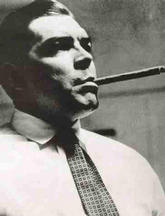 I have introduced a little capitalist experiment to my family in the form of a game. You know, capitalism is when you have some capital and you look around for what you can invest it in, in order to get it to grow as much as possible, so you get more back. That is as opposed to the worker / poor person / paycheck-to-paycheck mentality, which is that you look at what stuff you have, and you go work to get money so you can buy. some nicer stuff. Most of my life, including at this moment, I've been in that second category, spending all my money every month, or sooner, and I've had quite some disdain for the capitalist way of thinking. But, hey, I'm open to re-evaluating things once in a while. And what I do like is the idea that wealth is when you do more with less, and create big results with small means. So, here's the simple game: I have introduced a little capitalist experiment to my family in the form of a game. You know, capitalism is when you have some capital and you look around for what you can invest it in, in order to get it to grow as much as possible, so you get more back. That is as opposed to the worker / poor person / paycheck-to-paycheck mentality, which is that you look at what stuff you have, and you go work to get money so you can buy. some nicer stuff. Most of my life, including at this moment, I've been in that second category, spending all my money every month, or sooner, and I've had quite some disdain for the capitalist way of thinking. But, hey, I'm open to re-evaluating things once in a while. And what I do like is the idea that wealth is when you do more with less, and create big results with small means. So, here's the simple game:
Each of us, me, my wife Birgit, my son Zachery (16) and my daughter Marie (19), start with 100 dollars. The object of the game is to make it grow. We will check each week how we're doing. Since we all, me included, have very little idea on how to do it, we might support each other as to where to look for means that might work. But the idea is to develop some kind of business, preferably multiple streams of income, that will expand with as little work as possible, even while you sleep. And you'd be free to use no money at all, or to borrow money, and to involve other people's talents, etc.
I'm tired of working myself into the ground, and having my family just sort of take that for granted. Both they and I need an education in how to work smarter rather than harder. As to my kids, they would otherwise be ready to just go out and join the job market, get a low-paying job, and spend it all every month on buying stuff on credit. That's not really a legacy I'd like to leave them with.
[ Diary | 2002-11-24 15:02 | | PermaLink ] More >
|
|
|
|
Excellent article with many references, by Larry Chin, Online Journal. The U.S. imported 290 million barrels of crude oil from Iraq in 2001, at below market rates, because of U.N. sanctions. The US was "the main market for Iraqi crude" according to the Middle East Economic Survey. It seems a lot like the threatened war is simply an attempt to eliminate Russia, France and China from the competition from the oil there, and to put the U.S. oil companies in complete control of the resources.
[ Information | 2002-11-24 15:53 | | PermaLink ] More >
|
|
|
|
 "Something animated and vital looks out from our childrenÂ’s eyes. Whatever it is, we recognize it and know it is precious. Yet except in rare cases today, that spirit is broken early and irreparably. The light goes out all too soon. We know, because at some inarticulate and dimly conscious level, we are those children. We feel the wind of spirit move us at odd moments, but put it down to nostalgia or temporary possession by some impractical flight of fancy. We shake it off and get back to work. Robbed of a voice to speak of these things, something animated and vital looks out from our own eyes, but only in rare, unguarded moments -- and even then, wary, circumspect, suspicious. We let no one see what we fear no one will understand." --Chris Locke "Something animated and vital looks out from our childrenÂ’s eyes. Whatever it is, we recognize it and know it is precious. Yet except in rare cases today, that spirit is broken early and irreparably. The light goes out all too soon. We know, because at some inarticulate and dimly conscious level, we are those children. We feel the wind of spirit move us at odd moments, but put it down to nostalgia or temporary possession by some impractical flight of fancy. We shake it off and get back to work. Robbed of a voice to speak of these things, something animated and vital looks out from our own eyes, but only in rare, unguarded moments -- and even then, wary, circumspect, suspicious. We let no one see what we fear no one will understand." --Chris Locke
[ Inspiration | 2002-11-24 23:18 | | PermaLink ] More >
|
|
|
|
Justin Hall has an excellent article about what might happen when weblogs go mobile. Potentially we might bring more of our lives into the story. Just about all cellphones can do text messages now, and the new generation have built-in cameras and can send and receive multi-media messages.A weblog is a record of travels on the Web, so a mobile phone log ('moblog'?) should be a record of travels in the world. Weblogs reflect our lives at our desks, on our computers, referencing mostly other flat pages, links between blocks of text. But mobile blogs should be far richer, fueled by multimedia, more intimate data and far-flung friends. As we chatter and text away, our phones could record and share the parts we choose: a walking, talking, texting, seeing record of our time around town, corrected and augmented by other mobloggers.
[ Information | 2002-11-24 23:18 | | PermaLink ] More >
|
|
| Saturday, November 23, 2002 |  |
|
|
|
 Part of what keeps us all from living in an entirely peaceful world is that, if we're honest about it, most of us find guns and violence and war very entertaining. War makes for great programs on the History Channel. Violence makes for great action movies, and most of us cheer when the good guy kills the bad guy at the end. Guns are kind of cool and sexy. It is a powerful feeling to shoot a gun. Part of what motivates people to be police officers or soldiers is that you drive fast, or fly expensive toys, and you chase bad guys and you blow things up. Part of what keeps us all from living in an entirely peaceful world is that, if we're honest about it, most of us find guns and violence and war very entertaining. War makes for great programs on the History Channel. Violence makes for great action movies, and most of us cheer when the good guy kills the bad guy at the end. Guns are kind of cool and sexy. It is a powerful feeling to shoot a gun. Part of what motivates people to be police officers or soldiers is that you drive fast, or fly expensive toys, and you chase bad guys and you blow things up.
But what we like is exactly the game aspect of it. The thrill and risk, the power, the rush, the gadgetry, the stimulating special effects. But if we are really exposed to the effects of violence and war, very, very few of us would think that it is cool. Just one bullet, or the tiniest of bombs, do horrible things to human bodies. Just one life lost, or one life lived as an invalid, can be a huge tragedy for the people involved. The only way we accept it as a society is to be detached from it, by just watching it on TV and thinking about it abstractly. Yeah, let's go whip Saddam's ass real good. Looks good on TV. But we aren't able to fathom the scope of what several hundred thousand dead Iraqi children means. It is just numbers. And most Americans have never even heard about those numbers.
We'll have to embrace our desire for action and violence, and provide for it, without leaving all those innocent victims behind. I hear people giving visions of the future where there is no violence. "In the New Civilization there must be no violence!" Aha, ok, then what are you going to do with the people who want it? Outlaw boxing and wrestling? Action movies? Body piercing? Jackass stunts? That's all violent stuff, but it is violence that people volunteer for. And it is entertaining. Hoping that nobody will be interested in watching it just isn't going to work. Finding a harmonious relation between all sides of ourselves is more likely to take us somewhere.
[ Opinions | 2002-11-23 20:21 | | PermaLink ] More >
|
|
|
|
Stimulating article by Fabio Sergio, covering many aspects of the connected world that's emerging, with many references. In the near past the concept of 'information anxiety' emerged. You know, there's so much information available that there always seems to be an ever-widening gap between what we know and what we think we should know. Now most well-connected people have probably given up on trying to know everything, and are probably getting used to the fact that you can figure out most things rather quickly, if your Internet connection is just close by. So, that opens up to the new concept of 'interaction anxiety'. I know that one. You know you could figure things out if you could just go to Google, or if you could just send a message to so-and-so, but if your DSL connection is down or you're on the road, you can't. Next step would be that everything would be more automatic, so you don't have to worry about what database you left that phone number in, or how you dial up to your ISP. The technology might become more invisible so you can concentrate on what you're doing.
[ Knowledge | 2002-11-23 20:21 | | PermaLink ] More >
|
|
|
|
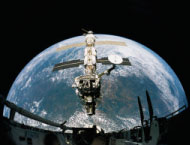 My son and I watched the Imax Space Station 3D movie. Imax is this system with huge screens, and it is also in 3D now. So here with the International Space Station, it was very much like being there. It gives a feeling of virtual presence that can't be conveyed through regular film or video. And that whole space station thing presents an optimistic, collaborative, global view on things. Here are a group of astronauts and scientists from a number of different countries, looking down on an earth without borders, working on interesting projects for the benefit of humanity, and having fun doing it. My son and I watched the Imax Space Station 3D movie. Imax is this system with huge screens, and it is also in 3D now. So here with the International Space Station, it was very much like being there. It gives a feeling of virtual presence that can't be conveyed through regular film or video. And that whole space station thing presents an optimistic, collaborative, global view on things. Here are a group of astronauts and scientists from a number of different countries, looking down on an earth without borders, working on interesting projects for the benefit of humanity, and having fun doing it.
Now, one thing that always strikes me about our supposedly most advanced earth technology is all those messy wires. That space station is just stuffed with cables and wires and tubes and stuff, lots of it hanging loose, and I'm sure that bad things happen if you cut any one of them. It is so vulnerable. Same thing in an airplane, if you look out the window by the wings when they're moving the flaps. Just a lot of wires and tubes out in the open. Our most advanced electronics, like in computers and satellites, seems to be done the same kind of way. Lots of flimsy wires and copper conduits soldered together with little dots of metal. A tiny crack in any one of them will bring down the whole thing. Seems awfully primitive.
[ Diary | 2002-11-23 23:59 | | PermaLink ] More >
|
|
| Friday, November 22, 2002 |  |
|
|
|
 Simon Buckingham talks about "What is Unorganization". The good kind of unorganization, that is. Simon Buckingham talks about "What is Unorganization". The good kind of unorganization, that is.The world we all live in has fundamentally changed for the better from the old organized model to today's unorganized one. In the orderly organized world, there was certainty and convention. In the global unorganized world there is freedom, diversity and instability. I like it already. He has some nice charts. He presents a scale going from the most organized types of societies - communism - through socialism, capitalism, finally towards what he calls 'technological capitalism', which he sort of positions as the best of all worlds.Socialism was a response to inequality, whereas capitalism can cause it. Under capitalism, new economic opportunities tend to present themselves to members of institutions such as companies or to people who have already benefited from other opportunities. Individuals acting alone face either high entry barriers or are excluded altogether from taking advantage of those market opportunities. The rich get richer and poor people stay poor. Under technological capitalism, there are both the free market opportunities AND the opportunity for all individuals to benefit from those opportunities. Individuals can participate more easily in, and benefit more fully from free market economies. Talent determines future wealth, not current wealth: poor people can become rich.
[ Organization | 2002-11-22 04:48 | 0 comments | PermaLink ]
|
|
|
|
Washington Post: Free Web Research Link Closed Under Pressure From Pay Sites. The Energy Department has shut down a popular Internet site that catalogued government and academic science research, in response to corporate complaints that it competed with similar commercial services.. Dan Gillmor says, and I agree, "The correct word for what has happened here is 'theft' -- because the government has allowed private interests to steal from the public domain. The claim that this was done to save money -- a paltry $200,000 a year -- doesn't even begin to pass the smell test. This was an arrangement on behalf of corporate interests, and an absolute thumb in the eye to the public. It's as if the book publishers persuaded communities to shutter public libraries..."
[ Information | 2002-11-22 04:48 | | PermaLink ] More >
|
|
|
|
 Seb has many good thoughts about how to facilitate group-forming. Like here about what sorts of people might be the best candidates to form groups. For example, people with well-specified problems and a well-defined environment, like programmers or mathematicians or puzzle solvers. Very interestingly, he has this comment about Activists and World-changers: Seb has many good thoughts about how to facilitate group-forming. Like here about what sorts of people might be the best candidates to form groups. For example, people with well-specified problems and a well-defined environment, like programmers or mathematicians or puzzle solvers. Very interestingly, he has this comment about Activists and World-changers:"These people are definitely motivated to form teams to create change. However, they've got perhaps the hardest task of all as regards defining what they want and how they want to get there. What they want is initially imagined and often difficult to state precisely; stating how they want to get there must be build upon a difficult to obtain description of the messy real world." He's right, and that's something I've run into a lot. World-changers are of course VERY motivated, but it might be very hard to agree on what exactly we're doing, and how.
[ Organization | 2002-11-22 15:44 | 0 comments | PermaLink ]
|
|
|
|
According to The Register, a group of Microsoft researchers have concluded that peer-to-peer file swapping networks will win and DRM (Digital Rights Management) and the lawyers will lose. We knew that all along, of course, but it is refreshing if even Microsoft might understand some of that. They explore a number of different scenarios, and conclude that no matter how much copy protection is put into hardware and software, smart people will always find ways to get around it, so they can share with each other. Most important is the understanding that file swapping networks are competitors to the monopolized 'legal' high-security media companies. If P2P networks deliver a higher quality and lower cost product, that's what people will choose. Of course people don't want crippled content that's expensive and complicated to buy, and which they can't use in ways that work for them. That is worth much LESS than a high quality product that is easy to get and to use. So, vendors will need to compete on price and convenience in order to stay in the game.
[ Knowledge | 2002-11-22 17:07 | | PermaLink ] More >
|
|
| Thursday, November 21, 2002 |  |
|
|
|
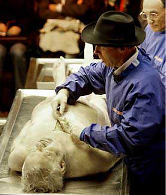 Public autopsy held in London. The controversial German doctor Gunther von Hagens, who previously caught some criticism for his anatomical exhibition Body Worlds, carried out the first public autopsy in many years, despite threats that he would be arrested. I applaud what he's trying to accomplish. I think it is very useful to show people how the human body works, in a dynamic and educational manner, and to get over our revulsion. Incidentally, I attended a couple of autopsies once. It was very educational, but didn't exactly strengthen my respect for modern medicine. I had imagined it to be a very precise science, sort of like clockwork repair. But it reminded me a whole lot more of a butchershop. I'll spare you the details here. Public autopsy held in London. The controversial German doctor Gunther von Hagens, who previously caught some criticism for his anatomical exhibition Body Worlds, carried out the first public autopsy in many years, despite threats that he would be arrested. I applaud what he's trying to accomplish. I think it is very useful to show people how the human body works, in a dynamic and educational manner, and to get over our revulsion. Incidentally, I attended a couple of autopsies once. It was very educational, but didn't exactly strengthen my respect for modern medicine. I had imagined it to be a very precise science, sort of like clockwork repair. But it reminded me a whole lot more of a butchershop. I'll spare you the details here.
[ Science | 2002-11-21 17:09 | | PermaLink ] More >
|
|
|
|
 MyLifeBits is a project where engineers are trying to develop a way of storing all of your life in a database. Well, it sounds like a piece of vaporware, and they're mainly talking about just storing all your photos, all your videos and all your letters in one place. What I'd really like is *everything*, automatically recorded and neatly indexed and searchable. Of course there are few searches I'd rather not do, like "my most embarrassing moments", but there's a lot of useful stuff I'd like to remember more effortlessly without having to go around thinking about it. Anyway, curiously, the idea of storing your life in an infinite digital storage place, and the idea of hypertext, was proposed in the 40s by Vannevar Bush, George W's grandfather, who was a visionary electrical engineer who ended up running a lot of America's black projects at the time, first being part of the atomic bomb project, and later being a member of Majestic12. MyLifeBits is a project where engineers are trying to develop a way of storing all of your life in a database. Well, it sounds like a piece of vaporware, and they're mainly talking about just storing all your photos, all your videos and all your letters in one place. What I'd really like is *everything*, automatically recorded and neatly indexed and searchable. Of course there are few searches I'd rather not do, like "my most embarrassing moments", but there's a lot of useful stuff I'd like to remember more effortlessly without having to go around thinking about it. Anyway, curiously, the idea of storing your life in an infinite digital storage place, and the idea of hypertext, was proposed in the 40s by Vannevar Bush, George W's grandfather, who was a visionary electrical engineer who ended up running a lot of America's black projects at the time, first being part of the atomic bomb project, and later being a member of Majestic12.
[ Technology | 2002-11-21 17:09 | | PermaLink ] More >
|
|
|
|
 A Forbes article talks about the interesting possibilities in having sensors everywhere. You know, tiny little devices that power themeselves from solar or kinetic energy, and that are wirelessly networked data gathering points. There are a lot of problems in the world that can be avoided if there is a sensor watching for it. Polution, structural failures, traffic, crime, weather. The problem, of course, is that there are also power hungry governments who'd love to point these things at you and I, to catch us in doing something they don't like. A Forbes article talks about the interesting possibilities in having sensors everywhere. You know, tiny little devices that power themeselves from solar or kinetic energy, and that are wirelessly networked data gathering points. There are a lot of problems in the world that can be avoided if there is a sensor watching for it. Polution, structural failures, traffic, crime, weather. The problem, of course, is that there are also power hungry governments who'd love to point these things at you and I, to catch us in doing something they don't like.
[ Technology | 2002-11-21 21:58 | 0 comments | PermaLink ]
|
|
|
|
 I have this domain cr8.com which I feel particularly attached to, but I haven't figured out what to do with it yet. And, if you don't get it, it is supposed to sound like "CREATE". First of all, 3 letter .com domain names are very desirable, but very hard to come by. Not everybody gets the Create thing at first glance, and some people argue that it should be cre8, but I don't think that's as cool. I have gotten quite a few inquiries from other people who thought it was cool, who wanted to acquire it from me. But I jumped through some hoops to get it myself, so I don't let go of it easily. I'm still searching for the right thing to put behind it. Something about creativity or creative endeavors, obviously. A creative portal of some kind. Or a creative company or organization. I have cr8.it and a few other variations as well. Anyway, I'm just fishing for good ideas. Btw, on the subject of useless trivia, my shortest domain is b9.bz and my longest is supercalifragilisticexpialidocious.org, closely followed by idontknowwhattodowithmyself.com I have this domain cr8.com which I feel particularly attached to, but I haven't figured out what to do with it yet. And, if you don't get it, it is supposed to sound like "CREATE". First of all, 3 letter .com domain names are very desirable, but very hard to come by. Not everybody gets the Create thing at first glance, and some people argue that it should be cre8, but I don't think that's as cool. I have gotten quite a few inquiries from other people who thought it was cool, who wanted to acquire it from me. But I jumped through some hoops to get it myself, so I don't let go of it easily. I'm still searching for the right thing to put behind it. Something about creativity or creative endeavors, obviously. A creative portal of some kind. Or a creative company or organization. I have cr8.it and a few other variations as well. Anyway, I'm just fishing for good ideas. Btw, on the subject of useless trivia, my shortest domain is b9.bz and my longest is supercalifragilisticexpialidocious.org, closely followed by idontknowwhattodowithmyself.com
[ Diary | 2002-11-21 21:58 | | PermaLink ] More >
|
|
<< Newer stories Page: 1 ... 81 82 83 84 85 ... 97 Older stories >> |
|

This is a collage of things that catch my eye, things that need to be said, and stuff I really care about
TRUTH
BEAUTY
FREEDOM
LOVE
TECHNOLOGY
|
| Mon | Tue | Wed | Thu | Fri | Sat | Sun |
|---|
|
|
|
|
|
|
1 |
| 2 |
3 |
4 |
5 |
6 |
7 |
8 |
| 9 |
10 |
11 |
12 |
13 |
14 |
15 |
| 16 |
17 |
18 |
19 |
20 |
21 |
22 |
| 23 |
24 |
25 |
26 |
27 |
28 |
|
|




